Share
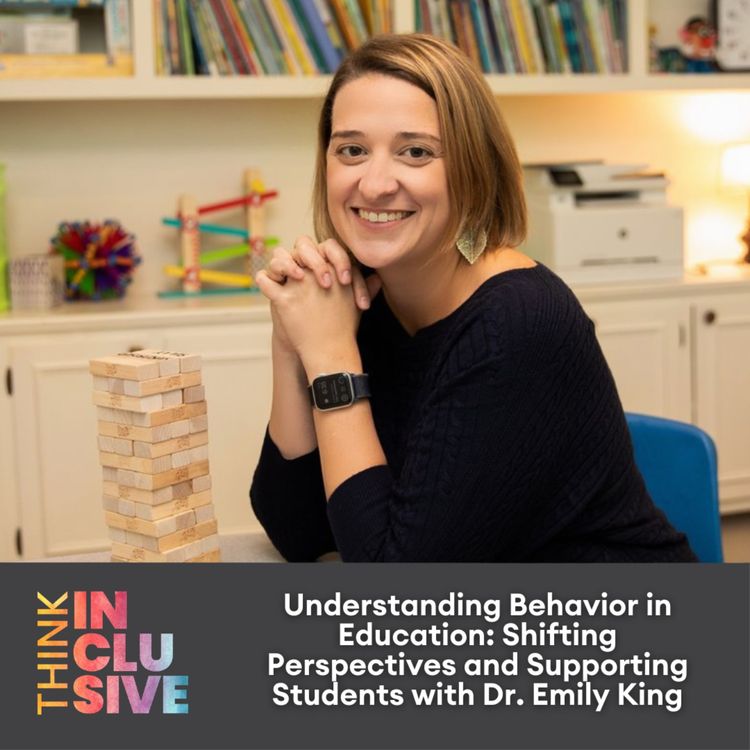
Think Inclusive
Understanding Behavior in Education: Shifting Perspectives and Supporting Students with Dr. Emily King
About the Guest(s): Dr. Emily King is a licensed psychologist with a background in school psychology and a passion for supporting neurodivergent individuals. Her professional history includes working as a school psychologist and providing consultation services for educators and parents. Dr. King focuses on understanding and supporting diverse learners' emotional experiences, utilizing her expertise to equip educators with the knowledge and tools to foster inclusive learning environments. She is also an advocate for parent-teacher collaboration, aiming to improve the education system for neurodiverse students.
Episode Summary: In this enlightening episode of the Think Inclusive podcast, host Tim Villegas invites Dr. Emily King to delve into the shifting landscape of educational support for behavior in schools. The conversation offers a compelling snapshot of the evolution that has occurred from a deficit framework towards a more inclusive and neurodiversity-affirming approach in classrooms. Vital concepts such as emotional regulation, behavior prevention, and the influence of neuroscience on understanding student behavior underpin the discussion, offering a rich tapestry of insights into modern educational practices.
Dr. King shares her personal journey through the field of school psychology, touching on how her own experiences as a parent and educator have shaped her philosophies on student behavior and discipline. With a significant shift towards understanding anxious behaviors and patterns, the episode uncovers strategies educators can utilize to anticipate and mitigate disruptive behaviors through rooted comprehension of each child's unique needs. Listeners will be guided through the nuances of functional behavior assessments and behavior intervention plans, highlighting the importance of adapting to learners' abilities for effective teaching.
Transcript: https://otter.ai/u/WwJu-DxoZpu8AwjwPp830QTjd0s
Key Takeaways:
- The transition from a deficit model to a more compassionate, neurodiversity-focused approach has reshaped support for student behavior.
- Functional behavior assessments and intervention plans need to align with the child's developmental stage for them to be successful.
- Preventing disruptive behaviors involves understanding the underlying motives and patterns rather than focusing solely on the behaviors themselves.
- Educators must strive to create classroom environments where students feel safe learning, expressing themselves, and navigating challenges.
- Embracing inclusive educational practices calls for training programs that prepare teachers to support an increasingly neurodiverse student population.
Resources:
Dr. Emily King's website: https://www.learnwithdremily.com/
Emily's Substack: https://learnwithdremily.substack.com/
The optimum context for learning; drawing on neuroscience to inform best practice in the classroom: https://explore.bps.org.uk/content/bpsecp/33/1/75
Thanks to DCMP for being our sponsor this week: https://dcmp.org/
MCIE Summer Institute: https://secure.givelively.org/event/maryland-coalition-for-inclusive-education-inc/mcie-summer-institute-2024
More episodes
View all episodes
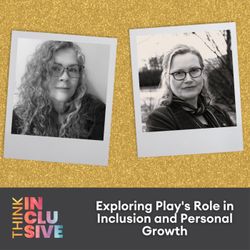
38. Exploring Play's Role in Inclusion and Personal Growth
01:02:29||Season 12, Ep. 38About the Guest(s):Dr. Leah Kelley is a distinguished neurodivergent education consultant, author, activist, educator, and parent. With 25 years of experience as a public school teacher, her roles have included primary teacher, inclusion resource teacher, and SEL Mental Health helping teacher. Leah is known for her national and international presentations on neurodiversity, advocacy, and inclusion, as well as her popular blog “30 Days of Autism.” She is a sought-after speaker recognized for her storytelling and practical wisdom, encapsulated in her book “The Person Who Arrives: Connecting Disability Studies to Educational Practice for Teachers, Parents, and Others.”Dr. Kari Gustafson is an instructor and researcher specializing at the intersection of neurodiversity, disability studies, education, and role-playing games. Kari holds a Ph.D. in Philosophy of Education from Simon Fraser University, where their dissertation delved into relationality and inclusion within role-playing games like D&D. Currently a faculty member in the Disability and Community Studies program at Douglas College, Kari brings a unique perspective to educational practices that prioritize strength-based collaboration and inclusivity.Episode Summary: In this episode of Think Inclusive, host Tim Villegas engages in a thought-provoking discussion with Dr. Leah Kelley and Dr. Kari Gustafson. The conversation delves into the importance of play and creativity within the context of inclusion, education, and disability studies. As advocates for neurodiversity, Leah and Kari offer insightful perspectives on how play can be an essential tool for both personal growth and collaborative learning, especially for individuals with disabilities.Complete show notes and transcript: https://mcie.org/think-inclusive/exploring-plays-role-in-inclusion-and-personal-growth/Key Takeaways:-Play is a vital tool for imagination, personal growth, and collaborative learning in neurodiverse and inclusive settings.-Societal pressures often replace play with structured therapies, particularly for children with disabilities, emphasizing the need to reclaim play.-Role-playing games, such as D&D, offer collaborative storytelling experiences that promote inclusivity and value diverse strengths.Embracing play can lead to increased joy and energy, benefiting personal well-being and educational outcomes.-Facilitating inclusive environments that prioritize creativity and play helps individuals thrive and fosters strength-based collaboration.Thank you to our sponsor, IXL: https://ixl.com/inclusive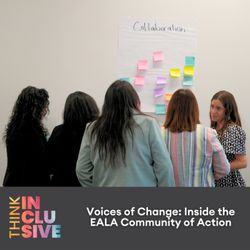
Voices of Change: Inside the EALA Community of Action
19:12||Season 12Episode SummaryIn this bonus episode of Think Inclusive, hosted by Tim Villegas, listeners are invited to relive a dynamic and innovative event organized by the Educating All Learners Alliance (EALA). The December 2024 retreat featured 22 mission-aligned organizations gathered for a 36-hour innovation sprint aimed at developing transformative projects in inclusive education. The event emphasized solutions co-designed by those closest to the challenges, offering fresh perspectives and actionable outcomes. With two standout projects each receiving $75,000 in funding, the retreat underscored the power of community-led grant making. This episode captures the behind-the-scenes experiences of participants as they share their reflections on creativity, collaboration, and the pursuit of inclusive education advancements.Throughout the episode, the emphasis is placed on collaboration and the significance of involving educators, families, and students in the co-creation process for meaningful outcomes. Featuring conversations with participants, such as Anna Evancic from the International Youth Foundation and Maribel Gardea of MindShift, listeners gain insight into the innovative solutions proposed, including Youth Action Power and the Transformative Engagement Alliance, both aimed at reshaping educational practices. The episode highlights the intersection of ideas and expertise, conveying the importance of diversity, understanding the needs of learners with disabilities, and fostering a collaborative spirit across educational communities.Complete show notes and transcript: https://mcie.org/think-inclusive/voices-of-change-inside-the-eala-community-of-action/Learn more about EALA's community of action: https://educatingalllearners.org/community-of-action/Thank you to the Educating All Learners Alliance for making Inclusion Today and this bonus episode possible. Learn more at https://educatingalllearners.org/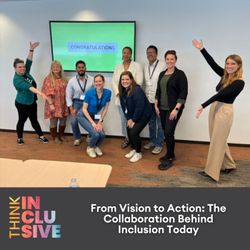
From Vision to Action: The Collaboration Behind Inclusion Today
43:06||Season 12Episode SummaryIn this insightful bonus episode of the Think Inclusive podcast, host Tim Villegas and the Inclusion Today team explore the collaborative journey embarked upon with the Educating All Learners Alliance. Igniting an ambitious national campaign, their goal is to ensure that more than a million students are educated in environments committed to inclusive learning practices. This episode captures the essence of their shared mission and navigates the challenges and triumphs of their team-based approach.The episode unravels the experiences during the Educating All Learners Alliance's Community of Action in December 2023, where educators from diverse backgrounds coalesced around a shared mission. Through detailed discussions, Tim, alongside his team, recounts how trust, collaborative synergy, and dedication shaped their successful initiative. They recount into how the Community of Action facilitated rich exchanges leading to the development of an inclusive toolkit, breaking down complex educational barriers to pave the way for sustainable inclusivity in education systems across the globe.Complete show notes and transcript: https://mcie.org/think-inclusive/from-vision-to-action-the-collaboration-behind-inclusion-today/Key TakeawaysThe power of trust and collaboration can significantly impact tackling educational challenges, guiding teams toward innovative solutions.Successful collaboration often involves acknowledging individual strengths and vulnerabilities, enabling participants to contribute uniquely to shared goals.Authentic inclusivity in education requires a thoughtful approach, focusing on accessible resources and actionable strategies.Participatory grant funding provides unique opportunities for organizations to address systemic educational issues proactively.Reflecting on experiences through constructive team feedback can enhance understanding and implementation of inclusive practices.To take the Inclusive Leadership Pledge and download the Starter Kit & Companion Guide go to https://educatingalllearners.org/inclusion-today/Thanks to the Educating All Learner Alliance for making Inclusion Today and this bonus episode possible. Learn more at https://educatingalllearners.org/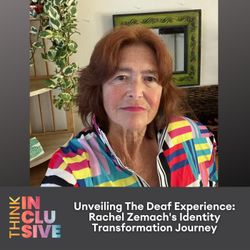
37. Unveiling The Deaf Experience: Rachel Zemach's Identity Transformation Journey
01:05:23||Season 12, Ep. 37About the Guest(s):Rachel Zemach is a deaf author and former educator with a passionate career centered around advocating for deaf students. Her profound experiences in mainstream education as a deaf teacher culminated in the writing of her book, "The Butterfly Cage: Joy, Heartache, and Corruption Teaching While Deaf in a California Public School," published in 2023. Rachel, who became deaf at the age of 10, is a strong proponent of positive deaf identity and sign language, striving to raise awareness about the challenges faced by deaf students in mainstream educational settings. She currently resides in Northern California.Episode Summary:In this engaging episode of Think Inclusive, host Tim Villegas speaks with Rachel Zemach, a deaf author and former teacher, about her firsthand experiences educating deaf children within California's public school system. The episode dives deep into the themes of inclusion, identity, and the significance of tailored education for deaf students. With her book "The Butterfly Cage" as the backdrop, Rachel shares transformative insights from her decade-long teaching career and discusses the deep impacts of a strong deaf identity.Rachel Zemach highlights the pressing issues mainstream education faces when accommodating deaf students, pressing for educational systems that embrace American Sign Language and deaf culture. The conversation explores how a better understanding of communication barriers and the hiring of deaf professionals can promote a conducive learning environment. The potential of inclusive education systems and their ability to cater to a diverse learning community without trying to "fix" or change deaf students is a central theme.Complete show notes and transcript: https://mcie.org/think-inclusive/unveiling-the-deaf-experience-rachel-zemachs-identity-transformation-journey/ Key Takeaways:-Deaf Identity and Education: Rachel Zemach emphasizes the need for deaf children to be taught by deaf teachers or in environments that celebrate deaf culture and identity.-Sign Language and Communication: Schools should promote the learning and use of American ------Sign Language to foster inclusivity and understanding among deaf and hearing students.-Mainstreaming Challenges: Mainstream education often inadequately supports deaf students, emphasizing speech over sign language, leading to communication breakdowns and educational inequity.-Benefits of Deaf Schools: Deaf schools provide a unique environment where deaf children thrive, offering cultural identity, peer connection, and effective communication.-Systemic Changes: Implementation of resources, like certified interpreters and deaf educators, is crucial for creating supportive and inclusive educational settings.Resources:Rachel Zemach's Book: The Butterfly Cage https://rachelzemach.com/Thank you to our sponsor, IXL Learning: https://ixl.com/inclusive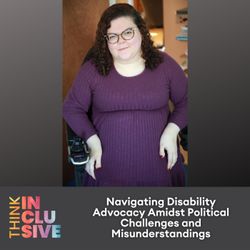
36. Navigating Disability Advocacy Amidst Political Challenges and Misunderstandings
42:53||Season 12, Ep. 36About the Guest(s):Emily Ladau is an activist, writer, and speaker, known for her relentless advocacy for disability rights. With a decade of experience, Emily serves as the editor of Able News, a digital newspaper amplifying the voices and stories of New York's vibrant disability community. Her involvement in disability rights extends beyond writing, as she continually seeks to inspire and challenge societal perceptions through her speaking engagements and published works, including her book aimed at bridging understanding between disabled and non-disabled communities.Episode Summary:In this stimulating episode of Think Inclusive, host Tim Villegas engages with long-time friend and leading disability advocate Emily Ladau. As they delve into pressing issues confronting minority groups, Emily reflects on the systematic erosion of rights for the disability community, particularly those with multiple marginalized identities. She provides personal insights into navigating these challenges while expressing the uncertainties of future potentials for individuals’ rights, especially under the current sociopolitical climate of 2025.The conversation moves to explore the intricacies of communicating effectively with diverse audiences, with an emphasis on thoughtfully engaging conservative politicians. Emily shares the balance of maintaining authenticity while strategically choosing words that resonate across party lines, addressing the need for cross-aisle dialogue in advancing disability rights. She also provides crucial advice for those striving to be allies, emphasizing the importance of mindful communication and adaptive advocacy efforts as tools for sustaining momentum in inclusivity goals. This episode is a rich tapestry of personal reflection and strategic insights, capturing the pulse of advocacy in challenging times.Complete show notes and transcript: https://mcie.org/think-inclusive/Key Takeaways:-The current sociopolitical environment is eroding disability rights, with advocates like Emily Ladau emphasizing the dire impacts on those with multiple marginalized identities.-Strategic vagueness in political rhetoric is creating an environment of fear and uncertainty, where advocacy requires deliberate and thoughtful communication.-Emily Ladau underscores the necessity of adjusting language to gain support from conservative audiences by aligning advocacy messages with core values.-Recognizing the limits of individual capacity, Emily advises allies to engage in advocacy through manageable actions without compromising personal well-being.-She stresses the significance of platforms like social media in advocating for disability rights, highlighting its dual role in fostering community and echo chambers.Resources:Emily's Website: https://emilyladau.com/Able News: https://ablenews.com/Thank you to our sponsor, IXL: https://ixl.com/inclusive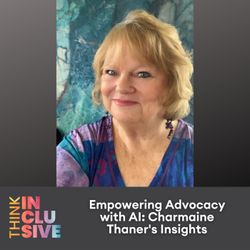
35. Empowering Advocacy with AI: Charmaine Thaner's Insights
54:58||Season 12, Ep. 35About the Guest(s):Charmaine Thaner is a seasoned educator and advocate with over 30 years of experience, who has dedicated her career to supporting families and children with special needs. As a mother to a son with Down syndrome, she blends personal experience with professional expertise to guide parents through the complexities of the Individualized Education Program (IEP) process. Thaner is the founder of the Connecting for Change group, where she coaches parents and offers innovative tools and techniques to empower them in educational advocacy, focusing on creating inclusive environments where every child feels valued and supported.Episode Summary:In this episode of the Think Inclusive Podcast, host Tim Villegas converses with Charmaine Thaner about the intersection of artificial intelligence and inclusive education advocacy. Villegas kicks off the episode with an intriguing twist — using an AI-generated version of his voice to introduce the topic and set the stage for a discussion on how AI can be leveraged as a tool for empowerment in educational advocacy.Thaner shares her journey into using AI tools like ChatGPT, describing how they have revolutionized her approach to helping parents navigate the IEP process. By integrating AI in drafting emails, summarizing meetings, and even crafting legislative communications, Thaner highlights the potential these tools hold for reducing stress and enhancing clarity for parents and educators alike. She discusses the nuanced art of crafting effective prompts and custom GPTs tailored to individual advocacy goals, and how Chris Voss's negotiation techniques inspire more engaging conversations in educational settings. Throughout the episode, Tanner emphasizes the importance of maintaining authentic human connections in advocacy work, even as AI tools enhance efficiency and precision.Complete show notes and transcript: (coming soon)Key Takeaways:-AI in Advocacy: Charmaine Thaner discusses how AI tools like ChatGPT can support parents in writing effective advocacy emails, summarizing meetings, and preparing for educational presentations.-Customized AI Solutions: Thaner introduces the concept of custom GPTs, tailored AI solutions that reflect personal advocacy goals and values, proving invaluable for individualized support.-Negotiation Techniques: Inspired by Chris Voss, Thaner utilizes negotiation strategies to craft more productive and empathetic communications with educators.-AI Beyond Emails: The use of AI extends to legislative advocacy, assisting parents in developing personalized messages to policymakers.-Human Connection: Despite AI's capabilities, Thaner stresses that authentic human interaction remains vital in advocacy efforts.Resources:Find Charmaine here: https://iep.today/CharmaineChris Voss's book: Never Split the Difference: https://amzn.to/4knHSx3AI tools mentioned: ChatGPT, Claude, Poe, and Descript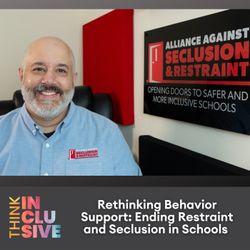
34. Rethinking Behavior Support: Ending Restraint and Seclusion in Schools
01:02:55||Season 12, Ep. 34About the Guest(s):Guy Stevens is a nationally recognized expert and advocate for ending restraint and seclusion in schools. He is the founder of the Alliance Against Seclusion and Restraint (AASR), a nonprofit organization focused on reforming punitive discipline practices in educational settings. Guy is also a board member of the ARC of Maryland and PDA North America. His advocacy is dedicated to promoting trauma-informed, neuroscience-aligned, and neurodiversity-affirming approaches that prioritize inclusive and safe educational environments for all students.Episode Summary:In this episode of Think Inclusive, host Tim Villegas is joined by Guy Stevens, a leading advocate for more humane behavior support strategies in schools. Through a riveting conversation, they explore the profound harms of traditional punitive practices, like restraint and seclusion, and the importance of trauma-informed educational frameworks. They delve into Guy's personal journey from a conventional understanding of behavior support to becoming a passionate advocate for transformative discipline practices.The discussion highlights the systemic challenges and widespread use of outdated behaviorist strategies such as PBIS, emphasizing the need for approaches that recognize the neuroscience of behavior. Guy shares his insights on the negative impacts of punitive measures on both students and educators, urging a shift towards more supportive and effective methodologies. Packed with educational insights and practical tips, this episode is a deep dive into creating more inclusive and empathetic learning environments.Complete show notes and transcript: (coming soon)Key Takeaways:-Understanding Behavior: Traditional behaviorist strategies often fail to address the real underlying causes of behavior, which are frequently rooted in stress and trauma.-Shift to Trauma-Informed Practices: Schools should move towards trauma-informed and neuroscience-aligned practices to promote better educational environments.-Restraint and Seclusion: These practices still present a significant problem in schools, resulting in safety risks and potential trauma for both students and educators.-PBIS and Behaviorist Strategies: While well-intentioned, these frameworks often lack the necessary depth to address individual student needs and may perpetuate exclusion.-Transformative Advocacy: By fostering curiosity and understanding the brain's role in behavior, educators can fundamentally change how they respond to and support students' needs.Resources:Alliance Against Seclusion and Restraint (AASR)Books Mentioned:Brain-Body ParentingBeyond BehaviorsSelf-RegRaising Kids with Big Baffling BehaviorsThank you to our sponsor, IXL.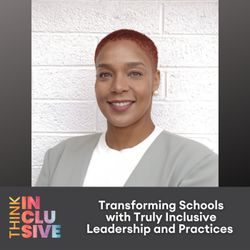
33. Transforming Schools with Truly Inclusive Leadership and Practices
51:46||Season 12, Ep. 33About the Guest(s):Toni Barton is a leader in education innovation and the founder of Speligent. She is a recognized authority on transforming schools through inclusive, equity-driven, and tech-enabled learning models, having gained vast experience as a teacher, principal, and district leader. Toni initiated the Inclusive Schools Leadership Institute at Relay Graduate School of Education, training leaders to construct anti-ableist, student-centered environments. Her insights have been featured in major publications including Forbes and The Hechinger Report. Toni is also known for her book, "Six Principles for Building a Truly Inclusive School," which is a resource for forward-thinking educators.Episode Summary:In this episode of the Think Inclusive Podcast, host Tim Villegas engages with Toni Barton in a deep dive into reshaping the educational landscape for inclusivity and equity. Toni shares her journey from a professional in law to an advocate in education, driven by her own son's experience with special education. This insightful discussion emphasizes the importance of actively implementing inclusive practices beyond mere acknowledgment, and how educators can cultivate environments where every student thrives.The conversation unpacks Toni’s book, "Six Principles for Building a Truly Inclusive School," detailing strategies for initiating inclusive leadership in educational institutions. Emphasizing anti-exclusionary program designs, building person-first cultures, and understanding the critical role of special education teachers in leadership roles, the episode provides practical steps for systemic change. Listeners walk away with a clear understanding of how urgent and strategic data use can drive student success and create schools that meet every student's needs.Complete show notes and transcript.Key Takeaways:-Inclusive Leadership: Special education teachers and leaders should aim for leadership roles to enact systemic change in education systems.-Truly Inclusive Schools: Emphasizes both academic progress and a genuine sense of belonging for students, as defined from the students' perspectives.-Anti-Exclusionary Program Design: Encourages creating systems that intentionally support historically marginalized students, promoting inclusive environments beyond just integrated placements.-Data Urgency: Stresses the importance of real-time data-driven decision-making to close performance gaps and enhance instructional effectiveness.-Person-First Culture: Advocates rethinking discipline and behavior systems as social-emotional frameworks that prioritize student-centered support.Resources:SpelligentSix Principles for Building a Truly Inclusive SchoolCulturally Responsive Teaching and the BrainToni’s WebsiteThank you to our sponsor, IXL.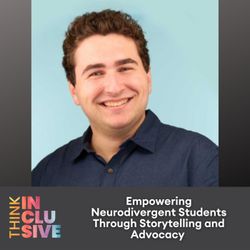
32. Empowering Neurodivergent Students Through Storytelling and Advocacy
41:02||Season 12, Ep. 32About the Guest(s): Riley Mulcahy is the founder and Executive Director of The Riley Project, a nonprofit organization focused on storytelling and community building for individuals with learning differences. A graduate of St. Mary's College of California with a background in English and Creative Writing, Riley is also the Marketing and Admissions Associate at Compass High School, where he champions inclusive, strengths-based education. He is an advocate for neurodiversity, dedicating his efforts to initiatives like the Neurodiversity Education Series, aimed at creating supportive systems for neurodivergent individuals. Episode Summary: In this enlightening episode of Think Inclusive, host Tim Villegas chats with Riley Mulcahy, a prominent advocate for individuals with learning differences. Riley discusses his journey with dyslexia and his commitment to creating inclusive environments through storytelling and advocacy. As the founder of the Riley Project, Riley sheds light on challenges and triumphs within the landscape of neurodivergent education. The episode gives listeners a deep dive into the concepts of multisensory instruction, the implications of the "Wait to Fail" model in schools, and the pivotal role of early intervention in supporting students with learning differences. Listeners will gain insights as Riley emphasizes the transformative power of storytelling in social change, drawing parallels between historical movements and current advocacy for neurodiversity. With a focus on practical strategies and technologies aiding learning differences, the discussion encompasses everything from reading interventions to the potential of AI-driven education tools. Whether you're an educator, parent, or advocate, this episode is packed with valuable information on fostering inclusive, supportive educational environments where all students can excel. Complete show notes and transcript.Key Takeaways: Power of Storytelling: Riley highlights how storytelling has been central to social justice movements, emphasizing its potential to drive change in the education system for those with learning differences. Multisensory Reading Instructions: Discussing the effectiveness of multisensory instruction methods, Riley underscores its importance for students struggling with traditional learning approaches. Early Intervention and Support: The episode stresses the necessity of early intervention and the creation of strength-based IEPs to help neurodivergent students thrive. Future of Education Technology: A spotlight on assistive technologies, text-to-speech, and AI as tools to help students with learning differences achieve better outcomes. Inclusion and Advocacy: The Riley Project aims to create safe spaces for individuals to share experiences, thus fostering a community of support and awareness. Resources: The Riley ProjectEducating All Learners AllianceDyslexic Advantage Proust and the Squid Thank you to our sponsor, IXL.